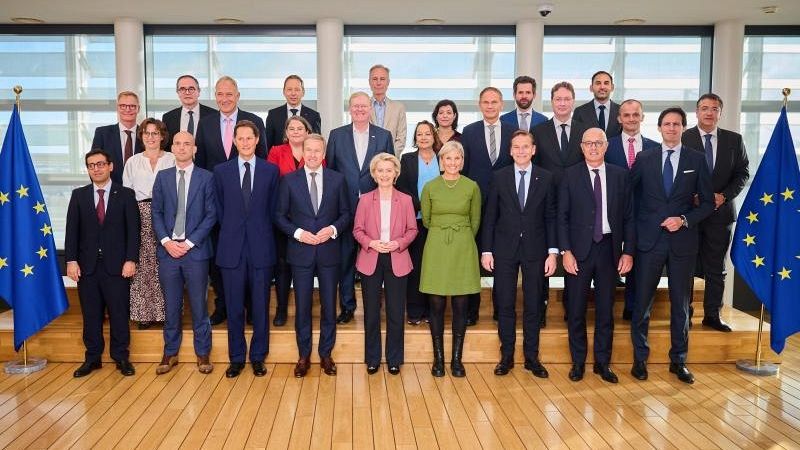
Europe Doubles Down on Electric Vehicle Transition Despite Industry Concerns
A recent high-level summit in Brussels has reaffirmed Europe's commitment to transitioning to electric vehicles, solidifying the strategic focus on electrification within the automotive industry. Despite concerns raised by manufacturers regarding the feasibility and pace of the transition, the European Commission appears steadfast in its goal of phasing out new combustion engine vehicles by 2035.
The meeting, attended by European Commission President Ursula von der Leyen and top executives from the automotive sector, highlighted both the industry's acceptance of the need to transition and the challenges that lie ahead. While manufacturers acknowledge the inevitable shift toward electric mobility, they have also voiced concerns about the practicalities of achieving the ambitious targets set by Brussels.
The 2035 Deadline: A Point of Contention
The 2035 target for phasing out new combustion engine vehicles remains a significant point of contention. While some business and political figures have called for a departure from this goal, the Commission appears unwilling to budge.
According to Audi CEO Gernot Döllner, electric cars are currently the most effective technology for reducing CO2 emissions in transportation. He argues that ongoing debates about preserving the combustion engine are counterproductive and create uncertainty for consumers.
Industry Calls for Support and Flexibility
European car manufacturers have urged the Commission to provide greater flexibility in the implementation of CO2 targets. They argue that achieving widespread adoption of electric vehicles requires a comprehensive approach that addresses infrastructure limitations, cost concerns, and consumer incentives.
Sigrid de Vries, director general of the European Automobile Manufacturers' Association (ACEA), emphasized the need for accelerated infrastructure development and reduced total cost of ownership for electric vehicles. She noted that the market share of battery electric passenger cars in the EU remains relatively low, indicating that mass-market adoption has not yet occurred.
According to ACEA, governments and regulators have not invested adequately in infrastructure and grid upgrades, and incentives remain inconsistent. These factors, they argue, make the regulatory targets increasingly difficult to achieve.
Key Challenges to Electric Vehicle Adoption
The automotive industry has identified several key challenges that must be addressed to ensure a successful transition to electric mobility:
- Insufficient Infrastructure: The availability of charging and refueling infrastructure, particularly for heavy-duty vehicles, remains a significant barrier.
- High Costs: The cost of purchasing and operating electric vehicles needs to be more competitive compared to traditional combustion engine vehicles.
- Inconsistent Incentives: Purchase incentives, taxation policies, and access to cities need to be more favorable for electric vehicles.
- Grid Modernization: Modernizing electricity grids and reforming energy markets are crucial to lowering electricity prices and ensuring a reliable power supply for electric vehicles.
Europe's Automotive Sector at a Crossroads
The European automotive industry, a vital component of the European economy, faces a complex set of challenges. Faltering sales, high energy prices, increasing competition from subsidized Chinese manufacturers, and a challenging trade environment due to US tariffs have all contributed to a sense of crisis within the sector.
In April, EU industry chief Stéphane Séjourné warned that the future of the global car industry could be shaped without Europe's involvement. He emphasized the need for decisive action to ensure the competitiveness of the European automotive sector in the face of global competition.
A Strategic Dialogue for the Future
The meeting in Brussels was part of a "Strategic Dialogue" initiated by the Commission to address the current crisis and chart a course for the future of the car industry. This was the third such meeting held since the beginning of the year, reflecting the urgency and importance of the issues at stake.
The Path Forward: Collaboration and Investment
The successful transition to electric mobility requires a collaborative effort involving governments, industry stakeholders, and consumers. Increased investment in infrastructure, consistent policy support, and innovative solutions are essential to overcome the challenges and unlock the full potential of electric vehicles.
Michiel Langezaal, CEO of Fastned and president of ChargeUp Europe, emphasized the need for a growth mindset and a focus on the actions required to make the transition to e-mobility a success for people, industry, and the environment.
By addressing the challenges and embracing the opportunities presented by electric mobility, Europe can solidify its position as a leader in the global automotive industry and achieve its ambitious climate goals. The stakes are high, with over 13 million jobs and 7% of the EU's GDP dependent on the success of the automotive sector.


No comments:
Post a Comment